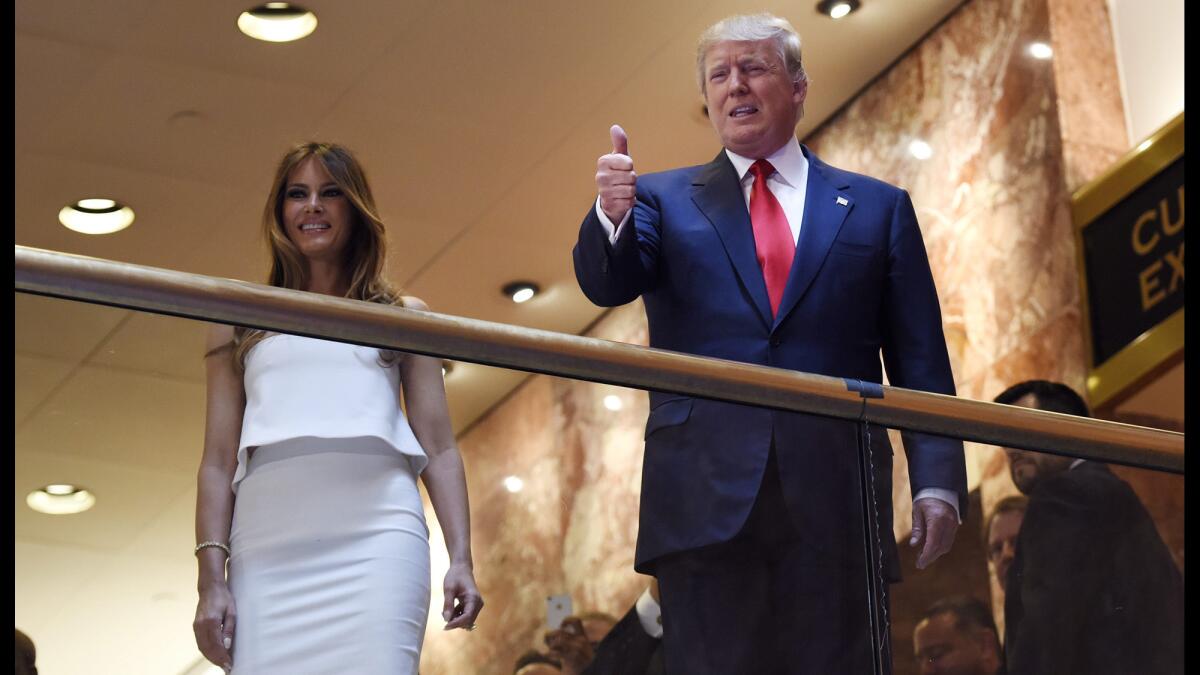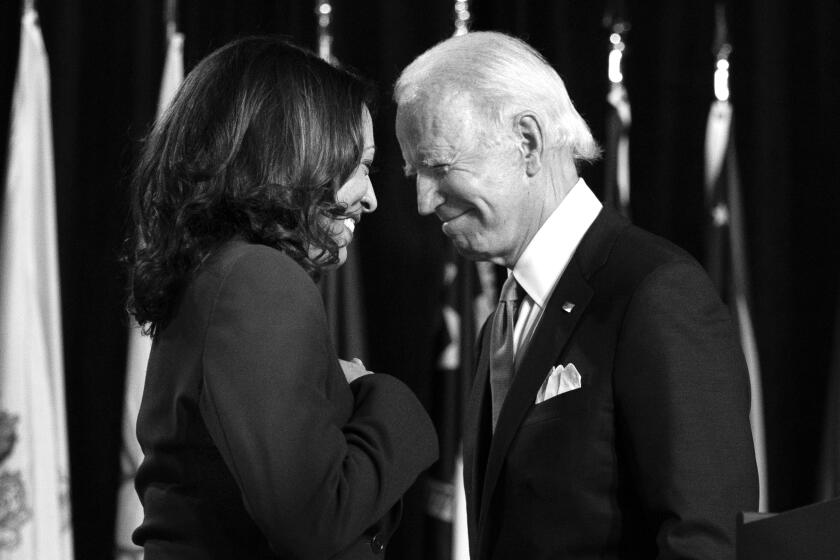Editorial: Character matters. Trump has none

- Share via
When Donald Trump, the shamelessly self-promoting Manhattan businessman and reality TV star, descended the grand staircase in Trump Tower five years ago to declare his candidacy for president of the United States, the world thought it was watching a publicity stunt.
And maybe it was. Trump was bombastic and racist from the outset, openly courting white xenophobic voters by falsely blaming immigrants and foreign nations for many of America’s woes. It seemed hardly a recipe for political success in a nation proudly built by immigrants and their descendants and led at the time by a Black president who, like Trump himself, was the son of an immigrant.
But then Trump, one of 17 main contenders for the Republican nomination, bullied and taunted his way through the primaries as other candidates dropped out. He rode right-wing discontent, working-class disillusionment with Washington, social conservatives’ eagerness for more antiabortion judges, and an open appeal to racial resentment that, dismayingly, won rather than lost him support until, to paraphrase Vin Scully, in an election cycle of the improbable, the impossible happened.
The Times editorial board watched with growing apprehension as Trump took over the Republican Party. In March 2016, the day after Trump won seven of 11 Super Tuesday Republican primaries, we categorically declared him “not fit to be president of the United States” because he lacked the relevant experience — this was the first elected office he had sought — and, more significantly, because he displayed none of the self-control, temperament, wisdom or vision required to lead a nation as large and complex as this one.
The Democratic nominee will face greater challenges than any president since F.D.R. We’re confident he’s up to the task.
Sadly, we have been proven right time and time again. In April 2017, after his first 10 weeks on the job, we pilloried Trump as “Our Dishonest President” in a series of editorials exploring the damage his erratic behavior, incessant lies and narcissism had already wrought on the nation’s standing as an international leader, as a reliable partner in diplomacy and trade, and as a defender of human rights (an admittedly inconsistent role over the years).
Further, his embrace of authoritarians and his attacks on democratic institutions (including those “enemies of the people,” the media) fed into an international wave of illiberalism as he embraced and amplified a range of cockamamie and sometimes dangerous conspiracy theories. He was, and remains, an amoral manipulator who cares for little more than himself and feeding his immense ego.
Not to minimize our criticisms of Trump’s policies, but aside from some appalling extremes (notably the cruel edge he’s applied to immigration), he hasn’t distinguished himself from garden-variety conservatives on taxes and regulation or from populists in both parties on trade and foreign entanglements. What has set him apart has been his comportment and the consequences thereof. Entrusted with a responsibility to be a leader and role model for 330 million people, his focus has been uniquely inward, his behavior deliberately divisive and antagonistic. Character counts in a president, and his has been extraordinarily lacking.
He fired FBI Director James B. Comey in part to try to derail an investigation into possible collusion between Russian agents and Trump’s election campaign, an atrocious act of self-preservation that elicited shrugs from Republican leaders. He warned special counsel Robert S. Mueller III not to investigate his family’s financial dealings. Hoping to damage former Vice President Joe Biden, Trump sought to enlist the aid of a new Ukrainian administration desperate for U.S. aid, a move even more astoundingly self-serving than firing Comey.
The Democratic-controlled House of Representatives impeached the president on charges of abusing the power of his office and obstructing Congress, but the Republican-controlled Senate refused to remove Trump, which leaves history to wonder what line might Trump have needed to cross before the Senate would have lived up to its constitutional responsibilities as a check on executive power.
Through it all, Trump has used his office to bolster his private business, including the Trump International Hotel just blocks from his office (a favorite meeting spot for supplicants, foreign and domestic), and his golf courses and the Mar-a-Lago resort (where he, his family and Secret Service detail made regular, taxpayer-underwritten trips). Those are displays of unabashed self-dealing that in normal times would have been sufficient for, at a minimum, a strong rebuke from Congress and the Republican Party.
But there is absolutely nothing normal about Trump and the times he has come to define, including his fumbled and delayed response to the COVID-19 pandemic, and the lies he has told to try to shift attention from it.
Reports that President Trump skirted paying taxes confirms what America already suspected, and makes ongoing investigations all the more important.
Oh yes, the lies, which the Washington Post has done the nation, and historians, a service by cataloguing. As of the end of the Republican National Convention in late August, the president of the United States had told 22,247 lies or misleading claims, an average of 17 a day since taking office. By the Post’s count, the rate has gone up to 50 lies or misleading claims a day in the final stage of the current campaign. Trump’s supporters often say they like him because he speaks his mind. What a mind it must be.
Trump won election four years ago in part by exploiting long-running divisions within our body politic. He gave voice, and presence, to some of the darker themes and elements of American society, past and present.
As Americans rose in protest over police officers killing Black people — which should outrage any real political conservative — the president, rather than seeking to understand and address the systemic problems that propelled people to the streets, instead disparaged the protesters. He seized on scattered acts of vandalism and violence to dismiss the rightful and righteous demands of tens of thousands of Americans that their government recognize the problems for which it had long been partially responsible and try to fix them.
Great leaders through history often emerged by being the right person at the right time. Abraham Lincoln, with whom Trump so falsely compares himself, was such a leader. Franklin Delano Roosevelt, who helped pull the nation out of the Great Depression and the world through the rise of fascism, also comes to mind.
Trump, though, not only is the wrong person for the crises of the time — the pandemic, the deep recession it triggered, global warming and a society fraying under the stresses of racism, personal financial hardship and a dangerously widening gulf between the haves and the have-nots — he is the wrong person for any moment.
And now is the moment to bring the sorry Trump saga to an end. Fearing a true verdict of the American voters, the president has actively sought to game the outcome of Tuesday’s election by undermining public faith in the voting system — our democracy — itself, serving a similar end to that pursued by Russian meddlers and other foreign interests who see their own gain from a disunited United States. That is not leadership. It is the flailing of an immoderate mind, and, we can only hope, the frustration of a desperate politician who finds himself running in sand.
More to Read
A cure for the common opinion
Get thought-provoking perspectives with our weekly newsletter.
You may occasionally receive promotional content from the Los Angeles Times.











